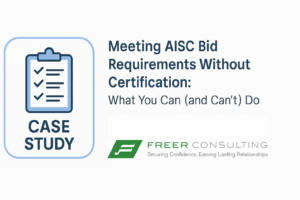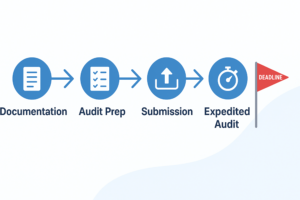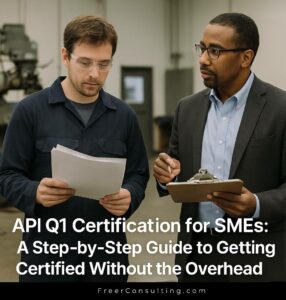For many small and mid-sized businesses, API Spec Q1 certification feels like it’s designed for large manufacturers with dedicated compliance teams. The paperwork, the audits, the cost—it can seem overwhelming when you already wear multiple hats just to keep daily operations running.
The good news: more and more small businesses are successfully achieving API Q1 certification. With the right approach, you don’t need a full compliance department or endless resources. What you do need is a clear understanding of the common obstacles—and how to overcome them.
Why API Q1 Matters for Small Businesses in 2025
The oil and gas supply chain has never been more competitive. Major operators and OEMs increasingly require suppliers to hold API Q1 certification. Without it, many small businesses can’t even bid on high-value contracts.
Beyond market access, API Q1 helps you:
- Build customer trust by showing you have consistent, documented processes.
- Improve quality and reduce rework, which saves time and money.
- Strengthen supplier oversight, which is especially important with new 2025 updates (10th edition + Addendum 2).
- Future-proof your business for other standards (ISO 9001, ESG requirements, cybersecurity in manufacturing).
In short: API Q1 is no longer optional if you want to compete seriously in oil, gas, or energy manufacturing.
The Biggest API Q1 Obstacles for SMEs
1. Limited Resources
Most small businesses don’t have a full-time quality or compliance manager. People juggle operations, sales, and safety alongside compliance, leaving little bandwidth for new systems.
2. Complex Documentation
API Q1 requires detailed manuals, procedures, calibration logs, and supplier records. Addendum 2 (effective December 2025) adds deeper supplier and sub-supplier documentation. That’s a big lift if you’re starting from scratch.
3. Training & Competency Gaps
Staff often wear multiple hats. Proving competency with training records and defined responsibilities is harder when everyone is already stretched thin.
4. Risk Management & Contingency Planning
Many SMEs handle risks informally. API Q1 expects structured risk assessments and contingency planning—processes that take time to design.
5. Supplier Oversight
With Addendum 2, you’re not just responsible for your direct suppliers—you must also account for their suppliers. That requires systems many small companies don’t have.
6. Change Management
The standard is updated frequently. Adjusting your processes every time API makes a change can feel like a moving target.
Practical Strategies to Overcome These Barriers
Start with a Right-Sized Plan
Don’t try to tackle everything at once. Begin with a scope definition and gap analysis—this shows exactly where your current processes fall short. Focus first on high-risk or customer-critical areas.
Leverage Templates and Expertise
You don’t have to reinvent the wheel. Well-built templates for manuals, forms, and procedures can save weeks of work. A consultant can help tailor these to your business without adding fluff you don’t need.
Build Internal Champions
Identify one or two staff members to “own” compliance responsibilities. With targeted training, they can manage your quality system without needing a full-time QA hire.
Use Affordable Digital Tools
Cloud-based QMS platforms, document control apps, and supplier management dashboards can make compliance easier and reduce manual record-keeping headaches. Many are designed for small companies and priced accordingly.
Run a Mock Audit
A pre-audit review—either internally or with outside help—can flag gaps before API arrives. Fixing issues early saves stress, cost, and credibility.
Case in Point: A Small Business Success Story
One of our clients, a regional manufacturer with under 50 employees, thought API Q1 was out of reach. They had no dedicated QA staff, and their processes were mostly verbal.
With a gap analysis, a set of customized templates, and focused training for two internal champions, they were audit-ready in 90 days. They not only achieved certification, but also landed a new contract within six months that more than covered the cost of implementation.
The takeaway: certification is realistic if you approach it with structure and support.
The ROI of API Q1 for Small Businesses
Yes, certification requires effort. But the return is real:
- Access to contracts that require API Q1
- Reduced scrap and rework, saving time and materials
- Improved reputation and trust with large customers
- Better supplier reliability through structured oversight
- A stronger culture of quality that pays off in every project
Think of it less as a cost and more as an investment in long-term growth.
How Freer Consulting Helps SMEs Succeed
At Freer Consulting, we’ve worked with small and mid-sized businesses across oil, gas, and industrial manufacturing. Our approach is designed for companies with limited resources:
- Gap analysis and roadmap to show exactly what’s needed
- Templates and tailored documentation to save time
- Staff training and internal champion development
- Mock audits and audit readiness support
Ready to Get Started?
If API Q1 still feels like a heavy lift, that’s where our process can help – to turn an overwhelming requirement into a clear, achievable plan.
Request a consultation to assess your API Q1 certification needs








